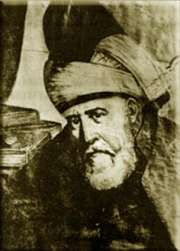Pagina: 4 : 3 : 2 : 1
Selecții: Furia leilor răgând
: din volumul: „Iubire și zbor extatic în Inima Divină Infinită”
Poezie 2018-05-25 (2971 afişări)
Selecții: În această iubire există foarte multe capricii
: din volumul: „Iubire și zbor extatic în Inima Divină Infinită”
Poezie 2018-06-03 (2880 afişări)
Selecții: Îți faci regulat vizite ție însuți
: din volumul: „Iubire și zbor extatic în Inima Divină Infinită”
Poezie 2018-06-06 (2858 afişări)
Selecții: Iubirea are un mănunchi de chei
: din volumul: „Iubire și zbor extatic în Inima Divină Infinită”
Poezie 2018-05-24 (2960 afişări)
Selecții: Jumătate din cuvinte au fost spuse
: din volumul: „Iubire și zbor extatic în Inima Divină Infinită”
Poezie 2018-06-10 (3161 afişări)
Selecții: Lasă-te în tăcere purtat
: din volumul: „Iubire și zbor extatic în Inima Divină Infinită”
Poezie 2018-06-01 (3029 afişări)
Selecții: Lăsați îndrăgostitul să fie nerecunoscător
: din volumul: „Iubire și zbor extatic în Inima Divină Infinită”
Poezie 2018-06-03 (2675 afişări)
Selecții: Lumina zilei, plină de mici particule dansând
: din volumul: „Iubire și zbor extatic în Inima Divină Infinită”
Poezie 2018-05-29 (2915 afişări)
Selecții: Mergi către pădurea leilor
: din volumul: „Iubire și zbor extatic în Inima Divină Infinită”
Poezie 2018-05-25 (2788 afişări)
Selecții: Mergi, spală-ți Inima de ură de șapte ori
: din volumul: „Iubire și zbor extatic în Inima Divină Infinită”
Poezie 2018-05-31 (2751 afişări)
Selecții: Mi-ar plăcea să te sărut
: din volumul: „Iubire și zbor extatic în Inima Divină Infinită”
Poezie 2018-05-29 (3003 afişări)
Selecții: Mintea este precum zahărul
: din volumul: „Iubire și zbor extatic în Inima Divină Infinită”
Poezie 2018-05-26 (2922 afişări)
Selecții: Mulți au rătăcit datorită Coranului
: din volumul: „Iubire și zbor extatic în Inima Divină Infinită”
Poezie 2018-06-08 (2900 afişări)
Selecții: Nu acorda prea multă importanță formei
: din volumul: „Iubire și zbor extatic în Inima Divină Infinită”
Poezie 2018-05-26 (2595 afişări)
Selecții: Nu voi dezvălui secretul tău
: din volumul: „Iubire și zbor extatic în Inima Divină Infinită”
Poezie 2018-05-23 (2743 afişări)
Selecții: O noapte plină de vorbe ce rănesc
: din volumul: „Iubire și zbor extatic în Inima Divină Infinită”
Poezie 2018-06-05 (2806 afişări)
Selecții: O, Iubire, nu ai loc în cer datorită înălțimii tale
: din volumul: „Iubire și zbor extatic în Inima Divină Infinită”
Poezie 2018-05-27 (2543 afişări)
Selecții: O, lumânare, tu pari să ai calitățile sufiților
: din volumul: „Iubire și zbor extatic în Inima Divină Infinită”
Poezie 2018-05-30 (2547 afişări)
Selecții: Palidă lumina
: din volumul: „Iubire și zbor extatic în Inima Divină Infinită”
Poezie 2018-06-05 (2896 afişări)
Selecții: Pentru iubiți singurul Maestru este frumusețea Ființei Preaiubite
: din volumul: „Iubire și zbor extatic în Inima Divină Infinită”
Poezie 2018-06-09 (2804 afişări)
Selecții: Pentru oameni numele Lui este Iubire
: din volumul: „Iubire și zbor extatic în Inima Divină Infinită”
Poezie 2018-06-01 (2779 afişări)
Selecții: Setea mă conduce jos în apă
: din volumul: „Iubire și zbor extatic în Inima Divină Infinită”
Poezie 2018-06-04 (2787 afişări)
Selecții: Sfărâmă sigiliul scrisorii
: din volumul: „Iubire și zbor extatic în Inima Divină Infinită”
Poezie 2018-05-24 (2938 afişări)
Selecții: Un secret se răsucește în noi
: din volumul: „Iubire și zbor extatic în Inima Divină Infinită”
Poezie 2018-06-08 (2768 afişări)
Selecții: Vino în livada înflorită
: din volumul: „Iubire și zbor extatic în Inima Divină Infinită”
Poezie 2018-05-30 (2868 afişări)
Selecții: Vinul pe care îl beau cu adevărat este propriul meu sânge
: din volumul: „Iubire și zbor extatic în Inima Divină Infinită”
Poezie 2018-06-04 (2596 afişări)
Selecții: Visurile sale, adesea zguduitoare
: din volumul: „Iubire și zbor extatic în Inima Divină Infinită”
Poezie 2018-05-29 (2813 afişări)
Selecții:Cine spune că Ființa Eternă nu există
: din volumul: „Iubire și zbor extatic în Inima Divină Infinită”
Poezie 2018-05-31 (2792 afişări)
Selecții:Te-am văzut și astfel am devenit gol
: din volumul: „Iubire și zbor extatic în Inima Divină Infinită”
Poezie 2018-06-07 (3124 afişări)
Sensul Iubirii
:
Poezie 2003-10-02 (10040 afişări)
Șoaptele dragostei
:
Poezie 2016-03-09 (4464 afişări)
Spring Giddiness
:
 Poezie 2005-05-06 (8964 afişări) Poezie 2005-05-06 (8964 afişări)
Spune repede – Da!
: din volumul: „Iubire și zbor extatic în Inima Divină Infinită”
Poezie 2018-04-25 (2912 afişări)
Sunt însetat de vinul din cupa Sa
: din volumul: „Iubire și zbor extatic în Inima Divină Infinită”
Poezie 2018-04-30 (2959 afişări)
Tărâmul interior
: din volumul: „Iubire și zbor extatic în Inima Divină Infinită”
Poezie 2018-04-30 (3383 afişări)
The Beloved is all
:
 Poezie 2003-11-15 (7493 afişări) Poezie 2003-11-15 (7493 afişări)
The Dome of the Inner Sky
:
 Poezie 2005-05-06 (10018 afişări) Poezie 2005-05-06 (10018 afişări)
Tinerilor îndrăgostiți le place să bea vin roșu
:
Poezie 2016-02-22 (3197 afişări)
Trezirea
: din volumul: „Iubire și zbor extatic în Inima Divină Infinită”
Poezie 2018-05-19 (3187 afişări)
Tu – și – eu
: din volumul: „Iubire și zbor extatic în Inima Divină Infinită”
Poezie 2018-05-21 (3035 afişări)
Un anumit sărut
: din volumul: „Iubire și zbor extatic în Inima Divină Infinită”
Poezie 2018-05-19 (2905 afişări)
Un mare car
: din volumul: „Iubire și zbor extatic în Inima Divină Infinită”
Poezie 2018-05-05 (2513 afişări)
Un sărut pe care îl dorim
:
Poezie 2016-03-09 (2973 afişări)
Un zâmbet și o bunătate
:
Poezie 2016-03-09 (2730 afişări)
Urmând chemarea
: din volumul: „Iubire și zbor extatic în Inima Divină Infinită”
Poezie 2018-05-20 (2503 afişări)
Vanatoarea
:
Poezie 2003-09-14 (8002 afişări)
Vino la mine
:
Poezie 2003-09-14 (10087 afişări)
Vino, haide să vorbim despre sufletele noastre!
: din volumul: „Iubire și zbor extatic în Inima Divină Infinită”
Poezie 2018-04-28 (2448 afişări)
Ziua mă rugam
:
Poezie 2016-02-24 (3077 afişări)
„O, Maestre, vino aici!”
: din volumul: „Iubire și zbor extatic în Inima Divină Infinită”
Poezie 2018-05-16 (2692 afişări)
Pagina: 4 : 3 : 2 : 1 |





